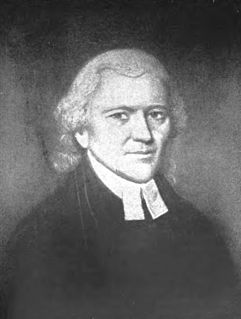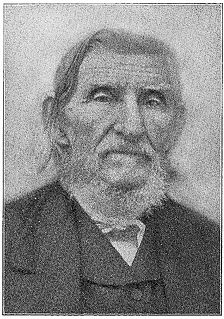Related Research Articles

Frederick Augustus Conrad Muhlenberg was an American minister and politician who was the first Speaker of the United States House of Representatives and the first Dean of the United States House of Representatives. A member of the Federalist party, he was delegate to the Pennsylvania state constitutional convention and a member of the U.S. House of Representatives from Pennsylvania and a Lutheran pastor by profession, Muhlenberg was born in Trappe, Pennsylvania. His home, known as The Speaker's House, is now a museum and is currently undergoing restoration to restore its appearance during Muhlenberg's occupancy.

John Christopher Kunze was an American Lutheran minister, educator, author and theologian.

Samuel Simon Schmucker was a German-American Lutheran pastor and theologian. He was integral to the founding of the Lutheran church body known as the General Synod, as well as the oldest continuously operating Lutheran seminary and college in North America.

Charles Porterfield Krauth was a pastor, theologian and educator in the Lutheran branch of Christianity. He is a leading figure in the revival of the Lutheran Confessions connected to Neo-Lutheranism in the United States.

Henry Louis Baugher was an American Lutheran clergyman and academic. He was the President of Gettysburg College from 1850 until 1868.

John Christian Frederick Heyer was the first missionary sent abroad by Lutherans in the United States. He founded the Guntur Mission in Andhra Pradesh, India. "Father Heyer" is commemorated as a missionary in the Calendar of Saints of the Lutheran Church on November 7, along with Bartholomaeus Ziegenbalg and Ludwig Ingwer Nommensen.

John Campanius, also known as Johan Campanius and Johannes Campanius, was a Swedish Lutheran priest assigned to the New Sweden colony.

Benjamin Kurtz was a German-American Lutheran pastor and theologian. He was part of the revivalist movement of the Lutheran Church in the 19th century, ran the Lutheran faith-based newspaper Lutheran Observer, founded the Lutheran faith-based Missionary Institute in Selinsgrove, Pennsylvania, and assisted in the founding of the Gettysburg Seminary.
Frederick David Schaeffer was a German-American Lutheran clergyman.
Frederick Christian Schaeffer was a Lutheran clergyman of the United States.

Charles Frederick Schaeffer was a Lutheran clergyman of the United States.
Charles William Schaeffer was a Lutheran clergyman and theologian of the United States.
John George Schmucker was a German-American Lutheran clergyman.

Justus Christian Henry Helmuth was a German-American Lutheran clergyman.
Frederick Rinehart Anspach was an American Lutheran clergyman, author and editor.

Edward Frederick Moldenke was a Lutheran theologian and missionary who worked in Prussia and the United States.

Gottlob Frederick Krotel was a Lutheran clergyman of the United States.
Samuel Worcester was a United States clergyman noted for his participation in a controversy over Unitarianism.

St. Michael's Evangelical Lutheran Church is a historic church building in the Mount Airy neighborhood of Philadelphia, just north of the Germantown neighborhood. The congregation was founded sometime before 1728 and three successive church buildings have occupied the same location since that time. The church was closed in 2016.

Henry Harbaugh was an American clergyman of the German Reformed Church.
References
- This article incorporates text from a publication now in the public domain : Wilson, J. G.; Fiske, J., eds. (1900). . Appletons' Cyclopædia of American Biography . New York: D. Appleton.